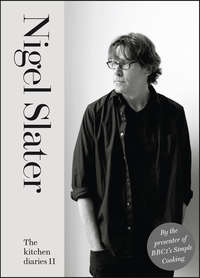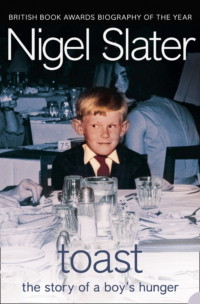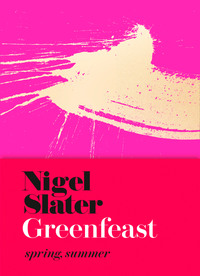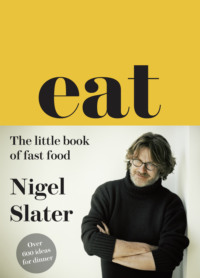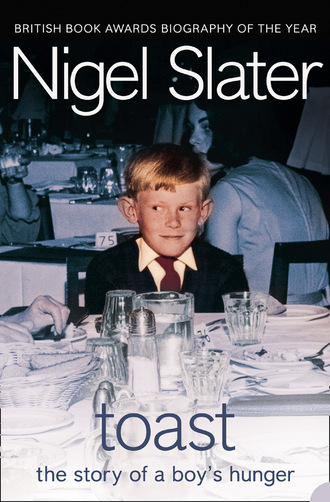
Полная версия
Toast
The Lunch Box
Josh, Mum and Dad’s new gardener, was cool. He had a black motorbike, a Triumph something or other, and used to bring his lunch neatly packed in a tin box. He licked his cigarette papers, tiny things with barely a pinch of tobacco in them, and rolled them into short flat cigarettes while he sat on his bike. Everyone liked Josh, Mum thought he was ‘such a good-looking young man, as bright as a button’, and Dad seemed more happy with him than he had been with the older guys who used to leave almost as soon as they had started. One was fired just because the frost got at Dad’s dahlias.
Unlike the other gardeners, Josh used to let me turn the compost with the long-handled, two-pronged fork that no one else let me touch and empty the mower box on to the heap. He let me weed the front of the borders where we had planted daisy-faced mesembryanthemums that only came out in the sun and balls of alyssum and drifts of pink and white candytuft. I watched the way he tied the clematis up when the string broke once in the wind, and when he used to pee on the compost. ‘Better not tell your dad I do that, it’s my secret way of getting the compost to work,’ he would say, turning as he shook himself and did up his buttons.
My father smiled, beamed almost, when I called plants by their proper names. Antirrhinum instead of snapdragon and Muscari instead of grape hyacinth. He gave a tired but amused little snuffle when I once corrected him about the name of a rose that he had called Pleasure when I knew it was Peace. Josh would take me round the borders, getting me to name as many plants as I could and would tease me when I confused azaleas and rhododendrons. Sometimes he would hoist me up on to his bare shoulders and charge around the garden making airplane noises and pretending to crash into the trees. We played football once, but my saves were so bad that the ball, an orange one belonging to my brothers, kept crashing into the marguerites and knocking them flat.
I liked the way Josh would let me sit and talk to him while he took a strip-wash in the outside toilet and changed back into his motorbike leathers. The way he would let me choose a biscuit – a Bourbon, a ginger nut, even a caramel wafer – from his lunch box and the way he never turned his back on me when he was drying himself with his frayed green-and-white-striped towel.
Jam Tarts
A great deal was made of my being tucked in at night. ‘I’ll come up and tuck you in’ was as near as my mother ever got to playing with me. Tucking me in was her substitute for playing ball, going to the park to play on the slide, being there on sports day, playing hide-and-seek, baking cakes, giving me chocolate kisses, ice cream, toffee apples, making masks and carving Halloween pumpkins. ‘I’ll come up and tuck you in’ was fine. It’s when she forgot that it wasn’t.
Every few weeks my mother and I would make jam tarts. She had small hands with long, delicate fingers. Gentle, like her name, Kathleen, and that of her siblings, Marjorie and Geoffrey. They say there was some Irish blood somewhere, but like my mother’s asthma no one ever spoke of it.
She would weigh the flour, the butter, the bit of lard that made the pastry so crumbly, and let me rub them all together with my fingertips in the big cream mixing bowl. She poured in cold water from a glass and I brought the dough together into a ball. Her hands started work with the rolling pin, then, once the ball of pastry was flat, I would take over, pushing the pastry out into a great thin sheet. We took the steel cookie cutters, rusty, dusty, and cut out rings of pastry and pushed them into the shallow hollows of an even rustier patty tin.
Mother didn’t like cooking. She did this for me. When she met my father she was working as a secretary to the mayor at the town hall and had never made so much as a sandwich. My father’s first marriage had lasted only a matter of months and was never, ever discussed. (By sheer chance, an old acquaintance of my father’s asked my brother if he was from the first or second marriage. Otherwise we would never have known.) She fell pregnant with me fifteen years after my brother Adrian was born and five years after they adopted his schoolfriend John. That’s when the asthma came on. When she was expecting me.
There had to be three different jams in the tarts. Strawberry, blackcurrant and lemon curd. It wasn’t till later I learned that plum, damson and marmalade made the best fillings. I put a couple of spoonfuls of jam into each pastry case, not so much that they would boil over and stick to the tin, but enough that there was more jam than pastry. My father loved a jam tart and would put one in whole and swallow it like a snake devouring a bird’s egg. Despite training as a gunsmith, he now owned a factory where they made parts for Rover cars, a factory that smelled of oil, where the machines were black and stood in pools of oily water. ‘A man was killed in that one there – he got his overall caught in the roller and it pulled him straight through, flat as a pancake,’ my father told me one day as we walked through the black hangar at dusk, its iron roof dripping and the stench of rust around us.
The tarts went in the top oven of the Aga until the edges of the pastry cases turned the pale beige of a Lincoln biscuit and the jam had caramelised around the edges. As the kitchen became hotter and more airless my mother would take her inhaler from the top drawer and take long deep puffs, turning her face away as she did so. Sometimes, she would hold her hand to her chest and close her eyes for a few seconds. A few seconds in which the world seem to stop.
My mother was polite, quietly spoken, but not timid. I once heard her telling off the delivery boy from Percy Salt’s the grocer because there was something on the bill that shouldn’t have been. I never heard her raise her voice. I am not sure she could have done if she wanted to. She certainly never did to me.
One day my father came home from work, and even before he had taken off his coat he grabbed one of our jam tarts from the wire cooling rack. He couldn’t have known they had come from the oven only a minute or two before. His hands flapped, his face turned a deep raspberry red, beads of sweat formed like warts on his brow, he danced a merry dance. As he tried to swallow and his eyes filled with the sort of tears a man can only summon when he has boiling lemon curd stuck to the roof of his mouth, I am sure that I saw the faintest of smiles flicker across my mother’s face.
Spaghetti Bolognese
‘We…are…going to have…spaghetti, no, SPAGHETTI…just try a bit of it. You don’t have to eat it if you DON’T LIKE it.’ Mum is yelling into Auntie Fanny’s ‘good’ ear. Quite why she thinks there is a good one and a bad one is a mystery. Everyone knows the old bat is deaf as a post in both.
Neither Fanny nor Mum has eaten spaghetti before, and come to think of it neither have I. Dad is waiting for the water to boil on the Aga. The sauce is already warm, having been poured from its tin a good half-hour ago and is sitting on the cool plate of the Aga, giving just the occasional blip-blop.
When the water finally boils my father shakes the strands of pasta out of the blue sugar paper that looks for all the world like a great long firework, and stands them in the bubbling water. They splay out like one of those fibre-optic lights we saw at the Ideal Home Exhibition on the BBC. As the water comes back to the boil he tries to push the spikes under the water. ‘They’ll never all go in,’ he snaps, trying to read the packet, which, even when read with bifocals, is in Italian. Some of the brittle sticks break in half and clatter over the hotplate.
‘Will I like it, Daddy?’ I ask, half hoping he’ll change his mind and Mum will cook us all some chops.
‘Just try it,’ he says, a somewhat exasperated tone creeping in to his voice. ‘Just try it.’
‘I think you should put some salt in,’ chirps in Mum.
Auntie Fanny is looking down at her lap. ‘Do I have to have some?’ I think she is going to cry.
‘I think it must be done now,’ says my father twenty minutes later. He drains the slithery lengths of spaghetti in a colander in the sink. Some are escaping through the holes and curling up in the sink like nests of worms. ‘Quick, get the plates, they’re getting away.’
We all sit there staring at our tumbling piles of pasta on our glass Pyrex plates. ‘Oh, Kathleen, I don’t think I can,’ sobs Auntie Fanny, who then picks up a long sticky strand with her fingers and pops it into her mouth from which it hangs all the way down to her lap.
‘No, wait for the sauce, Fanny,’ Mother sighs, and then quite out of character, ‘Come on, Daddy, hurry up.’ Dad spoons the sauce, a slurry of reddy-brown mince that smells ‘foreign’, over the knots and twirls of pasta. Suddenly it all seems so grown-up, so sophisticated.
Mum wraps the strands round her fork, ‘like this, do it like this,’ then shovels it towards Fanny’s wet, pink little lips. Most of the pasta falls down Fanny’s skirt, a little of the sauce gets caught on her bottom lip. She licks it off and shudders. ‘It’s horrible, it’s horrible. He’s trying to poison me,’ she wails. We all know she would have said the same even if it had been the most delectable thing she had ever eaten.
Ignoring Fanny’s little tantrum, I do as Mother bids, twirling the pasta round my fork while shovelling the escaping pieces back on with my spoon. I rather like it, the feel of the softly slippery noodles, the rich sauce which is hot, salty and tastes partly of tomato, partly of Bovril. I wouldn’t mind eating this every day. Unexpectedly, my father takes out a cardboard drum of grated Parmesan cheese and passes it to me to open.
‘What’s that you’ve got there?’ asks Mum.
‘It’s grated cheese, Percy Salt said you have to sprinkle it over the top, it doesn’t work if you don’t.’ Now we’re talking. I peel away the piece of paper that is covering the holes and shake the white powder over my sauce. I pass it to my father who does the same. Mum declines as she usually does with anything unusual. There is no point in asking Auntie Fanny, who is by now quietly wetting her pants.
Dad shakes the last of the cheese over his pasta and suddenly everyone goes quiet. I’m looking down but I can see my father out of the corner of my right eye; he has stopped, his fork in mid-air, a short strand of spaghetti hanging loose. His eyes have gone glassy and he puts his fork back down on his plate.
‘Daddy, this cheese smells like sick,’ I tell him.
‘I know it does, son, don’t eat it. I think it must be off.’
We never had spaghetti bolognese or Parmesan cheese again. Or for that matter, ever even talked about it.
Arctic Roll
There were only three of us at school whose house wasn’t joined to the one next door. Number 67 Sandringham Road, always referred to as ‘York House’, had mock-Tudor wooden beams, a double garage of which one half doubled as a garden shed and repository for my brothers’ canoes, and a large and crumbling greenhouse. I was also the only one ever to have tasted Arctic Roll. While my friends made do with the pink, white and brown stripes of a Neapolitan ice-cream brick, my father would bring out this newfangled frozen gourmet dessert. Arctic Roll was a sponge-covered tube of vanilla ice cream, its USP being the wrapping of wet sponge and ring of red jam so thin it could have been drawn on with an architect’s pen.
In Wolverhampton, Arctic Roll was considered to be something of a status symbol. It contained mysteries too. Why, for instance, does the ice cream not melt when the sponge defrosts? How is it possible to spread the jam that thin? How come it was made from sponge cake, jam and ice cream yet managed to taste of cold cardboard? And most importantly, how come cold cardboard tasted so good?
As treats go, this was the big one, bigger even than a Cadbury’s MiniRoll. This wasn’t a holiday or celebration treat like trifle. This was a treat for no obvious occasion. Its appearance had nothing to do with being good, having done well in a school test, having been kind or thoughtful. It was just a treat, served with as much pomp as if it were a roasted swan at a Tudor banquet. I think it was a subtle reminder to the assembled family and friends of how well my father’s business was doing. Whatever, there was no food that received such an ovation in our house. Quite an achievement for something I always thought tasted like a frozen carpet.
Pancakes
Mum never failed to make pancakes on Shrove Tuesday. Light they were, except for the very first one which was always a mess, though for some reason always the best. Mum made thin pancakes, in a battered old frying pan that was black on the outside and smelled of sausages, and we ate them with granulated sugar and Jif lemon. I loved the way the lemon soaked the sugar but never quite dissolved it, so you got the soft pancake, gritty sugar and sharp lemon all at once.
It was the best day of the year really, especially when she got going and they would come out of the pan as fast as we could eat them. Towards the end Mum would let me flip one. I always contrived it so that it landed on the floor, then she would say, ‘That’s enough’, and that would be it till next year.
Flapjack
On crackling winter mornings, with icicles hanging from the drainpipes, Mother would make flapjacks, stirring them in a thick, pitted aluminium pan and leaving them to settle on the back of the Aga. She would use a metal spoon, which acted as an effective alarm clock as it was scraped against the side of the old pan. They were one of the very few treats my mother ever made for us. My father would eat one or two, probably to encourage her rare attempts at home-making. While I would have to be held back from eating the entire tray. It was their chewy, salty sweetness I loved. Anyone who has never put a really large pinch of salt in with the oats, syrup and brown sugar is missing a trick.
Sometimes, she would leave a flapjack out for Josh too, and we would sit on his motorbike and eat them together. One bitterly cold day, I came home to a hall that smelled of warm biscuits. As I opened the kitchen door I smelled smoke and caught my mother tossing a batch of blackened flapjacks into the bin. There was a bit of charred shrapnel clinging to the edge of the tin which I tried unsuccessfully to prise off. Now they were being tipped into the pedal bin, tray and all. ‘I’m sorry, darling,’ she said, shaking her head. There were tears and something along the lines of ‘How could you do that, let the flapjacks burn? You’re hopeless, now there won’t be any for Josh tomorrow,’ and then I remember stomping into the greenhouse and telling my father he should get a new wife. One who didn’t burn everything.
Percy Salt
If you walked along Penn Road past the fish shop and towards the stately pile that is the Royal School for Boys, you came to Percy Salt’s the grocer’s. It was two shops really, a butcher’s on the right and on the left a cool, tiled grocer’s that had sawdust on the floor and where my mother did most of her shopping. It was here she bought the ham that the young assistants in long white aprons would cut to order from the bone; slices of white-freckled tongue for Dad and tins of peaches and thick Nestlé’s cream for us all. This was where we came for streaky bacon, for sardines and, at weekends, for cartons of double cream.
Percy Salt’s was the only place where my mother ran a tab. It was the custom for the better-off clientele, as was having their purchases delivered. This was where I would stand while Mum asked to taste the Cheddar or the Caerphilly and where she would pick up round boxes of Dairylea cheeses for me. Sometimes there would be little foil-wrapped triangles of processed cheese flavoured with tomato, celery (my favourite), mushroom and blue cheese. This was also where we came for butter and kippers, salad cream and honey, eggs and tea.
I loved our visits to Salt’s like nothing else. It was the smell of the shop as much as anything, a smell of smoked bacon and truckles of Cheddar, of tomatoes in summer and ham hocks in winter. At Christmas the windows would light up with clementines in coloured foil, biscuits in tins with stagecoaches on the lids, fresh pineapples, whole peaches in tins, trifle sponges and packets of silver balls and sugared almonds. Mother would buy wooden caskets of Turkish delight and crystallised figs, sugared plums and jars of cherries in brandy. It was here too that she would collect the brandy for the brandy butter, the bottles of Mateus Rosé, the cartons of icing sugar and the chocolate Christmas decorations that we hung on the tree and that I would sneak one by one over the holidays. Never was I happier than in Percy Salt’s at Christmas, even if my mother did once say he was getting ‘terribly dear’.
‘Dear’, when used in connection with money, was one of the expressions for which my mother would lower her voice, just as she did when she found someone ‘rather coarse’ or when someone had ‘trodden in something’. ‘Have you trodden in something’ was my mother’s discreet way of asking if you had farted. No surprise then that while Mr Salt called most of his customers ‘love’ he would always, always call my mother Mrs Slater.
Sweets, Ices, Rock and Politics
It would be wrong to say we were wealthy. ‘Comfortably off’ might be nearer the mark, though without the implied smugness. There were tinned peaches and salmon on the shopping list but Mum still checked Percy Salt’s delivery scrupulously, running her finger down the list and ticking things off with a blue biro. Dad took cuttings and planted seeds – yellow snapdragons, nemesia the colour of boiled sweets, and those daisy-faced mesembryanthemums that only opened up when the sun shone – because it was cheaper than buying ready-grown bedding plants. Needless to say I had no more pocket money than any of my school friends.
I bought the odd book, annuals mostly, a few singles, ‘Can’t Buy Me Love’ or Dusty Springfield’s ‘I Only Want To Be With You’, and once, a stick insect, but most of my pocket money went on sweets. Buying sweets, chocolate, even ice cream was shot through with more politics than an eight-year-old should have had to contend with. Sweets could put a label round a child’s neck in much the same way as a particular choice of newspaper could to an adult. For a boy certain things were off-limits. Fry’s Chocolate Creams and Old English Spangles were considered adult territory; Love Hearts and Fab ice creams were for girls. Parma Violets were for old ladies and barley sugars were what your parents bought you for long car journeys. Cones filled with marshmallow and coated in chocolate were considered naff by pretty much everyone, though I secretly liked them, and no one over six would be seen dead with a flying saucer. Sherbet Fountains were supposed to be strictly girly material, an idea which even then I refused to buy into. Milky Ways were what parents bought for their kids, which gave them a sort of goody-goody note as did Jacob’s Orange Clubs. Selection boxes were what you were given at Christmas by the sort of people who weren’t relatives but who nevertheless you called Auntie.
We never really bought the penny chews that Mr Dixon had loose on the counter, though I did nick the odd liquorice chew, the ones that came in blue-and-white striped paper, when his back was turned. Dad’s favourites were Callard & Bowser’s Butterscotch, which came in thin packs like cigarettes, and Pascall’s oblong Fruit Bonbons with gooey centres. He also loved peanut brittle, which he ate by the barful. Mine were sweet cigarettes, which may not have given me lung cancer but made up for it with fillings. At Christmas, Dad bought himself metal trays of Brazil nut toffee with their own little hammer from Thorntons, while I got more cigarettes, this time made of chocolate wrapped in paper which went soggy when you put it in your mouth. Dad said they were expensive. Mum only ate sweeties that came in round tins, old-fashioned things like lemon drops and fruit pastilles with a faint dusting of icing sugar or those chewy blackcurrant gums that came in a flat white-and-purple rectangular tin.
Boys’ stuff, by which I mean gobstoppers, Milky Bars and Rolos, never really hit the spot for me. I spent most of my money on sweets that made your tongue sore: acid drops, sherbet lemons, chocolate limes and roll after roll of Refreshers. The price for which was mouth ulcers the size of shirt buttons, and on which I would put salt-and-vinegar crisps to see just how much pain I could stand.
Holidays meant sticks of rock, pink or humbug-striped with red letters running through it. I never ate mine till I had kept it for at least six months in the fruit bowl. By which time it had gone soft and chewy, like mint-flavoured toffee.
Your choice of ice cream depended more on who was buying. Mum would get me a cornet with a rectangle of vanilla ice cream wrapped in white paper. It was an ice fraught with danger. You had to peel off the paper and push the block of ice cream down into the cornet while at the same time licking every last, precious drop of vanilla from the paper. For herself, she would get a little block of ice cream wrapped in paper and two wafers, or a choc ice in foil. The best bit was the crackly chocolate which was so thin that it would shatter and fall off into her lap in jagged pieces. At the cinema or the pantomime we always had tubs, though my father invariably complained about the price and having to queue for so long that the second half had started before he got back to his seat.
My parents disapproved of the ice-cream van, with its pineapple Mivvis and belching smoke. I found the music – wobbly, like a music box running down – faintly sinister, like those clowns with white faces and pointed hats. I think my parents just thought it was common to queue. My favourite was the banana lolly or the chocolate one which tasted like weak cocoa. Mum drew the line at Mr Whippy cornets, which she considered beyond the pale, and 99s were simply vulgar. Heaven knows what she would have said if she had seen me on my way to school, biting off the end and sucking the soft, grainy ice cream through the bottom.
Rice Pudding
Mother was desperate to be a homemaker, a woman capable of sewing on a button, darning a sock or icing a fairy cake. In the early evening, sitting under the standard lamp in the lounge, head tilted and the tip of her tongue pinched between her lips, she spent what seemed like hours trying to thread white cotton through the eye of a needle. ‘Let me do it’ was met with a sigh and ‘I’ve nearly done it now’. Try as she might, buttons popped off within a day or two, toes poked through neat but ineffective repairs, icing pooled into the craters in her cakes or, on the rare occasion they rose, ran down the sides in rivulets and stuck the flowery paper cases to the plate.
Mrs Poole made the beds, fed the winceyette sheets through the ironing machine with its long cotton-covered roller, and would sew a stray button on to my school shirt. Mother made up for this humiliation by making rice pudding. Warm, milky rice. Rice that never thickened the sweet liquid it floated in, so what should have been a creamy spoonful the texture of risotto had to be sipped, like broth. The skin browned and puffed into a black-and-gilt dome. The kitchen smelled like a kitchen should.
The skin was removed in one perfect scoop and deposited in my father’s bowl. ‘It’s the best bit,’ he used say. Then the round rice was fished up from the depths and divided between us all. Then she would pick up the enamel tin and spoon out the milk. ‘Anyone for jam?’ she would say, passing round the Hartley’s strawberry. I was the only taker, stirring the sweet glop into the milk then regretting it when it stayed in blobs and sank to the bottom of the dish.



